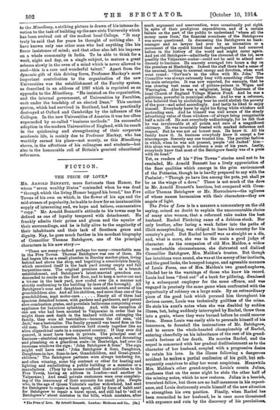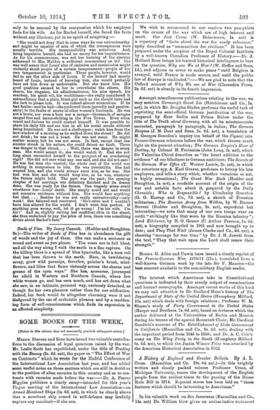FICTION.
THE PRICE OF LOVE.*
MR. ARNOLD BENNETT, more fortunate than Homer, for whom "seven wealthy States" contended when be was dead " through which the living Homer begged his bread," has Five Towns of his own on which, in the flower of his age and the mid-stream of popularity, he is able to draw for an inexhaustible supply of interesting and, we hope and believe, remunerative "copy." Mr. Arnold Bennett's attitude to his towns may be defined as one of loyalty tempered with detachment. He frankly admits their grime and gloom and the squalor of their surroundings, and he is fully alive to the angularity of their inhabitants and their lack of Southern grace and dignity. Nay, he goes much further in his mordant biography of Councillor Thomas Batchgrew, one of the principal
characters in his new story :—
"There are many—indeed perhaps too many—remarkable men in the Five Towns. Thomas Batchgrew was one of them. He had begun life as a small plumber in Burnley market-place, living behind and above the shop, and begetting a considerable family, which exercised itself in the back yard among empty and full turpentine-cans. The original premises survived, as a branch establishment, and Batchgrew's latest-married grandson con- descended to reside on the first floor, and to keep a motor-car and a tri-car in the back yard, now roofed over (in a manner not strictly conforming to the building by-laws of the borough). All Batchgrew's sons and daughters were married, and several of his grandchildren also. And all his children, and more than one of the grandchildren, kept motor-cars Nearly all of them had spacious detached houses, with gardens and gardeners, and patent slow-combustion grates, and porcelain bathrooms comprising every appliance for luxurious splashing. And, with the exception of one son who had been assisted to Valparaiso in order that he might there seek death in the tankard without outraging the family, they were all teetotallers—because the old man, ` old Jack,' was a teetotaller. The family pyramid was based firm on the old man. The numerous relatives held closely together like an alien oligarchical caste in a conquered country. If they ever did quarrel, it must have been in private. The principal seat of business—electrical apparatus, heating apparatus, and decorating and plumbing on a grandiose scale—in Banbridge, had over its immense windows the sign: John Batchgrew & Sons.' The sign might well have read : `John Batchgrew & Sons, Daughters, Daughters-in-law, Sons-in-law, Grandchildren, and Great-grand- children.' The Batchgrew partners wore always tendering for, and often winning, some big contract or other for heating and lighting and embellishing a public building or a mansion or a manufactory. (They by no means confined their activities to the Five Towns, having an address in London—and another in Valparaiso.) And small private customers were ever complain- ing of the inaccuracy of their accounts for small jobs. People who, in the age of Queen Victoria's earlier widowhood, had sent for Batchgrew to repair a burst spout, still by force of habit sent for Batchgrew to repair a burst spout, and still had to 'call at Batchgrew's' about mistakes in the bills, which mistakes, after • rho Frio. of Loos, By Arnold Bennett. London: Methuen and Co.. [6a.] much argument and asseveration, were occasionally put right. In spite of their prodigious expenditures, and of a certain failure on the part of the public to understand 'where all the money came from,' the financial soundness of the Batchgrews was never questioned. In discussing the Batchgrews no bank- manager and no lawyer had ever by an intonation or a movement of the eyelid hinted that earthquakes had occurred before in the history of the world and might occur again. And yet old Batchgrew—admittedly the cleverest of the lot, save possibly the Valparaiso soaker—could not be said to attend assi- duously to business. He scarcely averaged two hours a day on the premises at Hanbridge. Indeed the staff there had a sense of the unusual, inciting to unusual energy and devotion, when word went round : Gliv'nor's in the office with Mr. John.' The Councillor was always extremely busy with something other than his main enterprise. It was now reported, for example, that he was clearing vast sums out of picture-palaces in Wigan and Warrington. Also he was a religionist, being Chairman of the local Church of England Village Mission Fund. And he was a politician, powerful in municipal affairs. And he was a reformer, who believed that by abolishing beer he could abolish the poverty of the poor—and acted accordingly. And lastly he liked to enjoy himself. Everybody knew by sight his flying white whiskers and protruding ears. And he himself was well aware of the steady advertising value of those whiskers—of always being recognizable half a mile off. He met everybody unflinchingly, for he felt that he was invulnerable at all points and sure of a magnificent obituary. He was invariably treated with marked deference and respect. But he was not an honest man. He knew it. All his family knew it. In business everybody knew it except a few nincompoops. Scarcely any one trusted him. The peculiar fashion in which, when he was not present, people ' old Jacked' him— this alone was enough to condemn a man of his years. Lastly, everybody knew that most of the Batchgrew family was of a piece with its head."
Yet, as readers of his "Five Towns" stories need not to be reminded, Mr. Arnold Bennett has a lively appreciation of the finer qualities which emerge in the grim environment
of the Potteries, though he is hardly prepared to say with the Psalmist : " Though ye have lien among the pots, yet shall ye be as the wings of a dove." There is not much of the dove in Mr. Arnold Bennett's heroines, but compared with Coun- cillor Thomas Batchgrew or Mr. Horrocleave—the ugliness of whose names harmonizes with their characters—they are angels of light.
The Price of Love is in a measure a commentary on the old saying, coined no doubt to explain the unaccountable choice of many nice women, that a reformed rake makes the best husband. Rachel Fleckring came of a dubious stock. Her only brother, after luring a weak father into the paths of illicit moneylending, was obliged to leave his country for his country's good. But Rachel herself was as straight as a die, and, what is more, she was in the main a good judge of character. As the companion of old Mrs. Maldon, a widow in comfortable circumstances, she distrusted and disliked Councillor Batch grew, Mrs. Maldon's trustee. But though her intuitions were sound, she was at the mercy of her instincts, and the good looks, the honeyed tongue, and agreeable manners of Louis Fores, one of Mrs. Maldon's two grand-nephews, blinded her to the warnings of those who knew his record. Louis had been "fired out" of a bank for pilfering, dismissed by a subsequent employer for the same offence, and was engaged in precisely the same game when confronted with the opportunity of robbery on a large scale. By an extraordinary piece of the good luck which pursued hint throughout his devious career, Louis was technically guiltless of the crime. He stole his aunt's notes when she was disabled by sudden illness, but, being suddenly interrupted by Rachel, threw them into a grate, where they were burned before he could recover them. Hence Louis was easily able to persuade himself of his
innocence, to forestall the insinuations of Mr. Batchgrew, and to secure the whole-hearted championship of Rachel, entering cheerfully on his inheritance of the rest of his grand- aunt's fortune at her death. He marries Rachel, and the sequel is concerned with her gradual disillusionment as to the
character of her husband, coupled with a progressive desire to retain his love. In the illness following a dangerous accident he makes a partial confession of his guilt, but sub- sequently contrives to allay her worst suspicions. Meanwhile Mrs. Maldon's other grand-nephew, Louis's cousin Julian, confesses that on the same night be stole the other half of the missing notes, which he now restores. Julian is a boorish, truculent fellow, but there are no half-measures in his repent- ance, and Louis dexterously avails himself of the new situation to strengthen his own position. Finally, when Rachel brut been reconciled to her husband, he is once more threatened with exposure and ruin by the discovery of bis peculation',
only to be rescued by the compassion which his employer feels for his wife. As for Rachel herself, she faced the facts without any illusions, yet in no spirit of misgiving:—
" Sho would not deny that in some ways he was untrustworthy and might be capable of acts of which the consequences were usually terrible. His irresponsibility was notorious. And, being impulsive herself, she had no mercy for his impulsiveness. As for his commonsense, was not her burning of the circular addressed to Mrs. Maldon a sufficient commentary on it ? She was well aware that Louis' sins of omission and commission might violently shock people of a certain temperament—people of her own temperament in particular. These people, however, would fail to see the other side of Louis. If she herself had merely heard of Louis, instead of knowing him, she would probably have set him down as undesirable. But she know him. His good qualities seemed to her to overwhelm the others. His charm, his elegance, his affectionateness, his nice speech, his courtesy, his quick wit, his worldliness—she really considered it extraordinary that a plain, blunt girl such as she should have had the luck to please him. It was indeed almost miraculous. If he had faults—and he had—she preferred them (proudly and passion- ately) to the faults of scores of other women's husbands. He was not a brute, nor even a boor nor a savage—thousands of savages ranged free and terror-striking in the Five Towns. Even when vexed and furious he could control himself. It was possible to share his daily life and see him in all his social moods without being humiliated. He was not a clodhopper; watch him from the bow-window of a morning as he walked down the street ! He did not drink ; he was not a boast. He was not mean. He might scatter money, but he was not mean. In fact, except that one sinister streak in his nature, she could detect no fault. There was danger in that streak.. . . Well, there was danger in every man. She would accept it; she would watch it. Had she not long since reconciled herself to the prospect of an everlasting vigil? She did not care what any one said, and she did not care I He was the man she wanted; the whole rest of the world was nothing in comparison to him. He was irresistible. She had wanted him, and she would always want him, as he was. She bad won him and she would keep him, as he was, whatever the future might hold. Tho past was the past; the opening chapter of her marriage was definitely finished and its drama done. She was ready for the future. One tragedy alone could overthrow her—Louis' death. She simply could not and would not conceive existence without him. She would face anything but that. . . . Besides he was not really untrustworthy—only weak ! She faltered and recovered. 'He's mine and I wouldn't have him altered for the world. I don't want him perfect. If anything goes wrong, well, let it go wrong ! I'm his wife. I'm his !' And as, slightly raising her confident chin in the street, she thus undertook to pay the price of love, there was something divine about Rachel's face."



































 Previous page
Previous page